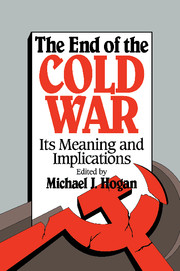Book contents
- Frontmatter
- Contents
- Preface
- The Authors
- Dedication
- 1 Introduction
- 2 An End to Which Cold War?
- 3 The Cold War, the Long Peace, and the Future
- 4 Quiet Cataclysm: Some Afterthoughts on World War III
- 5 Some Lessons from the Cold War
- 6 Nuclear Weapons and European Security during the Cold War
- 7 Victory in the Postwar Era: Despite the Cold War or Because of It?
- 8 The Wicked Witch of the West is Dead. Long Live the Wicked Witch of the East
- 9 The End and the Begining
- 10 A Balance Sheet: Lippmann, Kennan, and the Cold War
- 11 Why Did the Cold War Arise, and Why Did It End?
- 12 A View from Below
- 13 The End of the Cold War and the Middle East
- 14 The End of the Cold War in the Near East: What It Means for Historians and Policy Planners
- 15 After the Cold War: The United States, Germany, and European Security
- 16 The End of the Cold War: A Skeptical View
- 17 The End of the Cold War, the New Role for Europe, and the Decline of the United States
- 18 The Fading of the Cold War—and the Demystification of Twentieth-Century Issues
- 19 The U.S. Government, a Legacy of the Cold War
- 20 Foreign Policy, Partisan Politics, and the End of the Cold War
- 21 Beyond Bipolarity in Space and Time
- 22 A Usable Past for the Future
- Selective Bibliography
- Index
9 - The End and the Begining
Published online by Cambridge University Press: 18 December 2009
- Frontmatter
- Contents
- Preface
- The Authors
- Dedication
- 1 Introduction
- 2 An End to Which Cold War?
- 3 The Cold War, the Long Peace, and the Future
- 4 Quiet Cataclysm: Some Afterthoughts on World War III
- 5 Some Lessons from the Cold War
- 6 Nuclear Weapons and European Security during the Cold War
- 7 Victory in the Postwar Era: Despite the Cold War or Because of It?
- 8 The Wicked Witch of the West is Dead. Long Live the Wicked Witch of the East
- 9 The End and the Begining
- 10 A Balance Sheet: Lippmann, Kennan, and the Cold War
- 11 Why Did the Cold War Arise, and Why Did It End?
- 12 A View from Below
- 13 The End of the Cold War and the Middle East
- 14 The End of the Cold War in the Near East: What It Means for Historians and Policy Planners
- 15 After the Cold War: The United States, Germany, and European Security
- 16 The End of the Cold War: A Skeptical View
- 17 The End of the Cold War, the New Role for Europe, and the Decline of the United States
- 18 The Fading of the Cold War—and the Demystification of Twentieth-Century Issues
- 19 The U.S. Government, a Legacy of the Cold War
- 20 Foreign Policy, Partisan Politics, and the End of the Cold War
- 21 Beyond Bipolarity in Space and Time
- 22 A Usable Past for the Future
- Selective Bibliography
- Index
Summary
During the darkest periods of the Cold War, parallels were sometimes drawn to World War I. Armed conflict, it was said, could break out, as it had in 1914, through miscalculation, rhetorical posturing, and the technological imperatives of the new weapons. What was not imagined, however, was that the Cold War might suddenly come to an end in a way strikingly similar to that in which the war had ended on the eastern front in 1918: through the internal collapse and unconditional withdrawal of one of the belligerents. That one of the two superpowers might simply retire from the contest, that it would lose its empire and its internal cohesion, seemed no less improbable seventy-five years ago than, in a different context, does the demise of its successor today.
The collapse of the Russian state, which allowed the Bolsheviks to seize power, and the withdrawal of Russia from the war after the surrender at Brest-Litovsk, resulted from the rigidities of autocratic rule, the costs of fighting an interminable war, and the loss of faith by the nation's elite in the system itself. After the event, what had hitherto seemed unthinkable became strikingly obvious: Of course the Russian state, so outwardly formidable and unyielding, was merely a shell. Beneath the facade of invincibility, however, it was ripe for disintegration. It was almost inevitable, considering the toll of war, that the Romanov dynasty would fall. Was this not evident? Yet, of course, it was not evident at the time because virtually no one in a position of power wanted to believe it.
- Type
- Chapter
- Information
- The End of the Cold WarIts Meaning and Implications, pp. 103 - 112Publisher: Cambridge University PressPrint publication year: 1992



